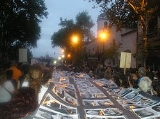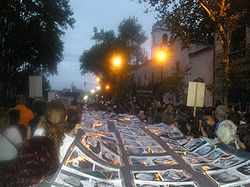
Ley de Obediencia Debida
Encyclopedia
Ley de Obediencia Debida (Spanish, Law of Due Obedience) was a law passed by the National Congress
of Argentina
after the end of the military dictatorship of the Proceso de Reorganización Nacional (which started with a coup d'état
in 1976 and ended in 1983). Formally, this law is referred to by number (Law No. 23521), like all others in Argentine legislation, but Ley de Obediencia Debida is the only designation in common use, even in official speeches.
 The law was passed on 4 June 1987. It dictates that it must be assumed, without admitting proof to the contrary, that all officers and their subordinates including common personnel of the Armed Forces, the Police, the Penitentiary Service and other security agencies cannot be legally punished by crimes committed during the dictatorship as they were acting out of due obedience
The law was passed on 4 June 1987. It dictates that it must be assumed, without admitting proof to the contrary, that all officers and their subordinates including common personnel of the Armed Forces, the Police, the Penitentiary Service and other security agencies cannot be legally punished by crimes committed during the dictatorship as they were acting out of due obedience
, that is, obeying orders from their superiors (in this case, the heads of the military government, who had already been tried in the Trial of the Juntas
).
This law was passed one year after the Ley de Punto Final
in order to contain the discontent of the Armed Forces. It effectively exempted military personnel under the rank of Colonel
from responsibility for their crimes, which included forced disappearance
s, illegal detentions, torture
and murder
s. Its text is rather short, with only 7 articles, the second of which contains an exception (the law does not apply to cases of rape, disappearance or identity forgery of minors, or extensive appropriation of real estate).
The Ley de Obediencia Debida and the Ley de Punto Final were repealed by the National Congress
in August 2003, which allowed for the re-opening of cases that involved crimes against humanity
. The first of such cases, which involved the former Buenos Aires Provincial Police
second-in-command Miguel Etchecolatz
, ended in September 2006 and laid down jurisprudence by acknowledging that the dictatorship's state terrorism
was a form of genocide
.
Argentine National Congress
The Congress of the Argentine Nation is the legislative branch of the government of Argentina. Its composition is bicameral, constituted by a 72-seat Senate and a 257-seat Chamber of Deputies....
of Argentina
Argentina
Argentina , officially the Argentine Republic , is the second largest country in South America by land area, after Brazil. It is constituted as a federation of 23 provinces and an autonomous city, Buenos Aires...
after the end of the military dictatorship of the Proceso de Reorganización Nacional (which started with a coup d'état
Coup d'état
A coup d'état state, literally: strike/blow of state)—also known as a coup, putsch, and overthrow—is the sudden, extrajudicial deposition of a government, usually by a small group of the existing state establishment—typically the military—to replace the deposed government with another body; either...
in 1976 and ended in 1983). Formally, this law is referred to by number (Law No. 23521), like all others in Argentine legislation, but Ley de Obediencia Debida is the only designation in common use, even in official speeches.

Superior Orders
Superior orders is a plea in a court of law that a soldier not be held guilty for actions which were ordered by a superior office...
, that is, obeying orders from their superiors (in this case, the heads of the military government, who had already been tried in the Trial of the Juntas
Juicio a las Juntas
The Trial of the Juntas was the judicial trial of the members of the de facto military government that ruled Argentina during the dictatorship of the Proceso de Reorganización Nacional, which lasted from 1976 to 1983...
).
This law was passed one year after the Ley de Punto Final
Ley de Punto Final
Ley de Punto Final was a law passed by the National Congress of Argentina after the end of the military dictatorship of the Proceso de Reorganización Nacional . Formally, this law is referred to by number Ley de Punto Final (Spanish, roughly translated Full Stop Law) was a law passed by the...
in order to contain the discontent of the Armed Forces. It effectively exempted military personnel under the rank of Colonel
Colonel
Colonel , abbreviated Col or COL, is a military rank of a senior commissioned officer. It or a corresponding rank exists in most armies and in many air forces; the naval equivalent rank is generally "Captain". It is also used in some police forces and other paramilitary rank structures...
from responsibility for their crimes, which included forced disappearance
Forced disappearance
In international human rights law, a forced disappearance occurs when a person is secretly abducted or imprisoned by a state or political organization or by a third party with the authorization, support, or acquiescence of a state or political organization, followed by a refusal to acknowledge the...
s, illegal detentions, torture
Torture
Torture is the act of inflicting severe pain as a means of punishment, revenge, forcing information or a confession, or simply as an act of cruelty. Throughout history, torture has often been used as a method of political re-education, interrogation, punishment, and coercion...
and murder
Murder
Murder is the unlawful killing, with malice aforethought, of another human being, and generally this state of mind distinguishes murder from other forms of unlawful homicide...
s. Its text is rather short, with only 7 articles, the second of which contains an exception (the law does not apply to cases of rape, disappearance or identity forgery of minors, or extensive appropriation of real estate).
The Ley de Obediencia Debida and the Ley de Punto Final were repealed by the National Congress
Argentine National Congress
The Congress of the Argentine Nation is the legislative branch of the government of Argentina. Its composition is bicameral, constituted by a 72-seat Senate and a 257-seat Chamber of Deputies....
in August 2003, which allowed for the re-opening of cases that involved crimes against humanity
Crime against humanity
Crimes against humanity, as defined by the Rome Statute of the International Criminal Court Explanatory Memorandum, "are particularly odious offenses in that they constitute a serious attack on human dignity or grave humiliation or a degradation of one or more human beings...
. The first of such cases, which involved the former Buenos Aires Provincial Police
Buenos Aires Provincial Police
The Buenos Aires Provincial Police is the police service responsible for policing the Province of Buenos Aires, in Argentina....
second-in-command Miguel Etchecolatz
Miguel Etchecolatz
Miguel Osvaldo Etchecolatz is a former senior Argentine police officer, who worked in the Buenos Aires Provincial Police during the first years of the military dictatorship. Etchecolatz was an active participant in the "anti-subversion operation" known as the National Reorganization Process...
, ended in September 2006 and laid down jurisprudence by acknowledging that the dictatorship's state terrorism
State terrorism
State terrorism may refer to acts of terrorism conducted by a state against a foreign state or people. It can also refer to acts of violence by a state against its own people.-Definition:...
was a form of genocide
Genocide
Genocide is defined as "the deliberate and systematic destruction, in whole or in part, of an ethnic, racial, religious, or national group", though what constitutes enough of a "part" to qualify as genocide has been subject to much debate by legal scholars...
.
See also
- Amnesty lawAmnesty lawAn amnesty law is any law that retroactively exempts a select group of people, usually military leaders and government leaders, from criminal liability for crimes committed.Most allegations involve human rights abuses and crimes against humanity.-History:...
- Juicio a las JuntasJuicio a las JuntasThe Trial of the Juntas was the judicial trial of the members of the de facto military government that ruled Argentina during the dictatorship of the Proceso de Reorganización Nacional, which lasted from 1976 to 1983...
- Ley de Punto FinalLey de Punto FinalLey de Punto Final was a law passed by the National Congress of Argentina after the end of the military dictatorship of the Proceso de Reorganización Nacional . Formally, this law is referred to by number Ley de Punto Final (Spanish, roughly translated Full Stop Law) was a law passed by the...
- Carapintadas
- Nuremberg Defense

